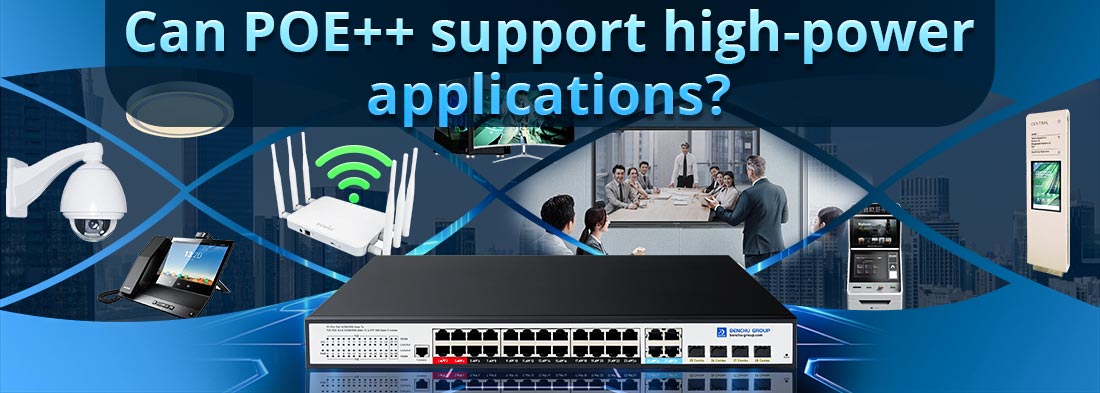
Да, PoE++ (Power over Ethernet Plus Plus), также известный как IEEE 802.3bt, предназначен для поддержки приложений с высоким энергопотреблением. Это усовершенствованная версия Power over Ethernet (PoE) и Power over Ethernet Plus (PoE+), обеспечивающая повышенную подачу мощности по стандартным кабелям Ethernet.
Подача электроэнергии в PoE++:
PoE++ может передавать до 60 Вт (Вт) мощности на порт по кабелям Ethernet Cat5e или выше по сравнению со стандартными 15,4 Вт. PoE (IEEE 802.3af) и 25,5 Вт в PoE+ (IEEE 802.3at). Это делает PoE++ идеальным для питания устройств с высокими требованиями, которым требуется больше энергии, чем может обеспечить стандартный PoE, включая высокопроизводительные IP-камеры, точки беспроводного доступа (WAP), оборудование для видеоконференций и другие устройства с высокой мощностью.
Существует два типа PoE++:
1. Тип 3 (802.3bt, 60 Вт): Это обеспечивает мощность до 60 Вт на порт. Он подходит для приложений среднего уровня мощности, таких как видеокамеры высокой четкости, более крупные точки беспроводного доступа или многофункциональные устройства.
2. Тип 4 (802.3bt, 100 Вт): Это обеспечивает мощность до 100 Вт на порт, что позволяет поддерживать более энергоемкие приложения. Примеры включают камеры с панорамированием, наклоном и масштабированием, цифровые вывески и устройства со встроенными нагревательными элементами или большими экранами.
Как PoE++ поддерживает приложения с высоким энергопотреблением:
Сила над расстоянием: PoE++ может подавать электроэнергию на расстояние до 100 метров (328 футов) по стандартным кабелям Ethernet, что означает, что устройства высокой мощности могут быть расположены на расстоянии от источника питания без необходимости использования отдельных источников питания.
Снижение сложности инфраструктуры: Обеспечивая передачу данных и питание по одному и тому же кабелю Ethernet, PoE++ устраняет необходимость в дополнительных адаптерах питания, уменьшая сложность прокладки кабелей и установки.
Повышенная энергоэффективность: PoE++ использует интеллектуальное управление питанием для обеспечения эффективного распределения энергии. Технология регулирует мощность в зависимости от потребностей устройства, гарантируя подачу правильного количества энергии и сводя к минимуму потери.
Поддержка нескольких устройств: Благодаря способности выдавать до 100 Вт PoE++ может питать несколько устройств от одного порта Ethernet, что делает его привлекательным вариантом для установки нескольких устройств в офисах, кампусах и промышленных приложениях.
Приложения с высоким энергопотреблением, использующие PoE++:
IP-камеры безопасности: PoE++ позволяет IP-камерам с изображением высокого разрешения, функциями поворота, наклона и масштабирования (PTZ) и инфракрасным (ИК) освещением питаться по тому же кабелю, который используется для передачи данных.
Точки беспроводного доступа (WAP): Высокопроизводительные точки беспроводного доступа, поддерживающие несколько устройств или высокоскоростные сети Wi-Fi, могут извлечь выгоду из дополнительной мощности, доступной через PoE++.
Цифровые вывески: Большие экраны или интерактивные системы цифровых вывесок часто требуют большей мощности для работы дисплеев, оборудования для обработки видео и интерактивных сенсорных панелей.
Системы видеоконференцсвязи: PoE++ может обеспечивать питание больших устройств видеоконференцсвязи, включая камеры, микрофоны и акустические системы, по одному кабелю Ethernet.
Системы точек продаж (POS): Некоторые продвинутые POS-системы включают сенсорные экраны, принтеры и сканеры, которые могут питаться с использованием PoE++.
Устройства Интернета вещей: Мощные устройства IoT, поддерживающие передачу данных в реальном времени, датчики или другие активные компоненты, также могут получать питание через PoE++.
Ключевые преимущества PoE++ для приложений высокой мощности:
Экономическая эффективность: Уменьшает потребность в дополнительных силовых кабелях, розетках и адаптерах питания, снижая общие затраты на установку.
Масштабируемость: Легко масштабируется для питания большего количества устройств в более крупных сетях, таких как офисные здания, умные города или промышленные комплексы.
Безопасность: PoE++ включает в себя встроенные механизмы безопасности, такие как защита от перегрузки по току, обеспечивающие безопасную работу даже при питании устройств с высокими требованиями.
В заключение, PoE++ поддерживает высокомощные приложения, подавая до 100 Вт на порт, что делает его отличным решением для питания и передачи данных устройствам, которым требуется больше энергии, таким как камеры высокой четкости, современные точки беспроводного доступа и большие системы отображения. Универсальность в сочетании с упрощенной инфраструктурой делает PoE++ популярным выбором для современных высокопроизводительных сетевых сред.